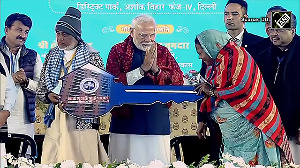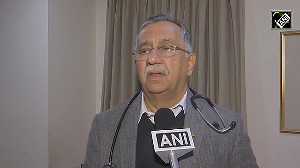 In this film the Ka -- as in the Ka-poors, who act in the film -- are okay, it is the Ki -- as in Bal-Ki, who directs it -- who stumbles rather badly, feels Raja Sen.
In this film the Ka -- as in the Ka-poors, who act in the film -- are okay, it is the Ki -- as in Bal-Ki, who directs it -- who stumbles rather badly, feels Raja Sen.
As a Bengali, I have traditionally struggled with the Hindi language, and particularly its ideas of gendered grammar, the stree-ling and pu-ling.
Growing up, I was flummoxed by the fact that the word Police, in Hindi, is a feminine one, which doesn't quite match up to the visuals of mustachioed constables demanding a little something -- or, for that matter, even the moustache itself, the word 'moochhein', being a ki rather than a ka.
It was thus with some expectation of (at least grammatical) subversion that I walked into Ki & Ka which promised, in its tagline, that stree-ling and pul-ling are the same thing.
But no. In this film the Ka -- as in the Ka-poors, who act in the film -- are okay, it is the Ki -- as in Bal-Ki, who directs it -- who stumbles rather badly.
The film aims for something progressive in an attempt to strike a blow against traditional gender roles, but only presents us more stereotyping.
It is a good-natured but thickheaded film, one that has too little to say to justify its feature-length running time.
The film opens with Kareena Kapoor, stretching her acting chops to the limit while pretending she can't dance.
She's downing whiskey at a wedding she doesn't like, and when asked by a prospective suitor if they should hit the floor together, she fobs him off by blaming her menstrual cycle, shouting aggressively about having her period.
Um, okay.
Moonlight and waltzes may certainly be related, but this is a step too far.
On a flight, she meets the whimpering Arjun Kapoor, and the two start hanging out together, which seems weird.
She's understandably curious about this crybaby who heralds his ambition to be like his mother -- how unbelievably outré, the makers feel -- but he relentlessly keeps negging her, mocking her ambitions while celebrating his own.
That, to be fair, may be his whole play: telling this stunning woman her nose looks like baby-corn and her hair like spaghetti could well be the most clutterbreaking move of all.
These two kooks decide that they can split home and workplace duties without conflict, and he proposes marriage which ticks all the right boxes in her head.
Her mother, played by the excellent Swaroop Sampath, is intrigued by this union of two people who share a birthday with the day the Titanic sank, and -- apparently not believing in remembering too many dates -- suggests they marry on the same day as well.
The writing is painful right from the start -- the first half-hour of the film, in fact, is the most unbearably moronic. For a while there I gave the film the benefit of the doubt, thinking that caricaturish broadstrokes -- she works on Sundays, he reads cookbooks in bed -- might be the director's unsubtle way of getting the equality point across.
This idea is emphasised by the way Arjun recites his lines like he's in a musical without music, but soon it becomes clear that the film is as dimwitted as the protagonists.
The film starts off saying that men and women can each do what the other can, but it splits the union unfairly, making the woman skeptical, shrieky and given to paranoia while the level-headed man is not just a TEDx-speaking oil-endorsing chef, but also one who can provide a 'Dharmendra moment' whenever the wife most needs one.
Groan.
Watching the amiable, ambling Arjun Kapoor play a fitness instructor is just one of the few things that beggars belief in this film.
Meanwhile, the arguments that have some steam also amount to nothing.
Kareena is at a business dinner, having a conversation when Arjun sidles up and interrupts her mid-sentence, asking when they can eat.
She understandably cuts him off, but later in their room -- completely out of nowhere, completely out of character -- he accuses her of sleeping her way to success.
She lambasts him, saying his noble homemaker ambitions and talk of progression are just a front and his thinking is typically petty, and as an answer he... kisses her. Because what better way to resolve an argument than shutting someone up? (For good measure, while they make out, Balki keeps cutting to ejaculatory shots of fountains.)
The film's cinematography is another massive blunder.
The great PC Sreeram works his focus-puller overtime as he shoots characters in close-up and then pulls out and pushes in, like a schizophrenic drunkard trying to eavesdrop. It's massively distracting, and instead of lending dynamism the scenes, it ends up taking away from the conversation.
Visually, the film is made bizarre anyway by the hero's obsession with trains, an obsession that turns a perfectly nice flat into something rather psychotic, where a locomotive runs through the lunch table.
This idea of making the boy a man-child -- who likes toy-trains and goes to buy milk on a Segway -- is a trope that doesn't work at all in a film that is trying to stress his maturity.
The rest is bilge -- but bilge, you see, that knows when and how to make room for shameless product placement.
This film is funded, I assume, mostly by the skilful way adman Balki makes sure the one lamp in a hospital room is placed just right, so you can see the brand of suitcase the heroine prefers.
There is, however, one great scene.
It is one where Jaya and Amitabh Bachchan, playing themselves, sit and discuss the idea of a woman working while a man handles housework. It is a finely written scene -- when she says he can't even boil water, he reasonably enough says he'll hire help -- and Mrs Bachchan even conjures up the image of Amitabh looking over the kitchen while she goes out to give the Sunday darshan, a visual that seems alarmingly unthinkable today, and one that evokes memories of their classic Abhimaan, one of the best films made about marriage and ego.
As for the current actors, Kareena looks dazzling and holds up her lines quite well, even when the script needs her to fly into reasonless rage, while Arjun lumbers through his part likably enough.
Ah, where we could have ended up, given a genuinely clever script...
Ki & Ka wants to be important, it wants to be revolutionary, it wants to be a feminist statement of equality. Admirable, sure. But it doesn't know how.
It is a film that thinks it knows better, but really -- really -- doesn't.
This is a film without breasts that desperately wants to burn a bra.
Rediff Rating: 











 © 2025 Rediff.com -
© 2025 Rediff.com -